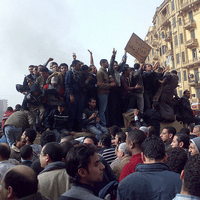An open-ended sit-in in Cairo's Tahrir Square will enter its seventh day today and may grow larger if calls for another major Friday protest are met. Five months after an 18-day uprising brought down President Hosni Mubarak, a substantial number of Egyptians feel that the pace of change has been too slow to satisfy their revolutionary demands. They are holding major demonstrations in Tahrir Square and around the country, explicitly condemning the ruling military council that took over after Mubarak's resignation and pushing for faster and deeper reforms.
In the week since the latest round of protests began, the interim government -- as well as the military council that appointed it and which most believe holds most of the political power in Egypt -- has been making concessions on a series of important issues to protesters. But following months of piecemeal and insufficient reforms, pro-change Egyptians regard these concessions with skepticism. What will happen next remains uncertain.
When Mubarak stepped down on Feb. 11, many suspected that, as much as the millions of protesting Egyptians, it was the military's fear of prolonged unrest that pushed him out, making the ouster perhaps a military coup as much as a revolution. To fill Mubarak's presidential role, a hastily assembled 20-member body called the Supreme Council of Armed Forces (SCAF) took over. The SCAF then appointed an interim cabinet composed largely of figures from Mubarak's government to run the country until elections. In mid-March, the SCAF introduced and, critics say, hurriedly pushed through a "constitutional declaration" that was ratified via referendum.

